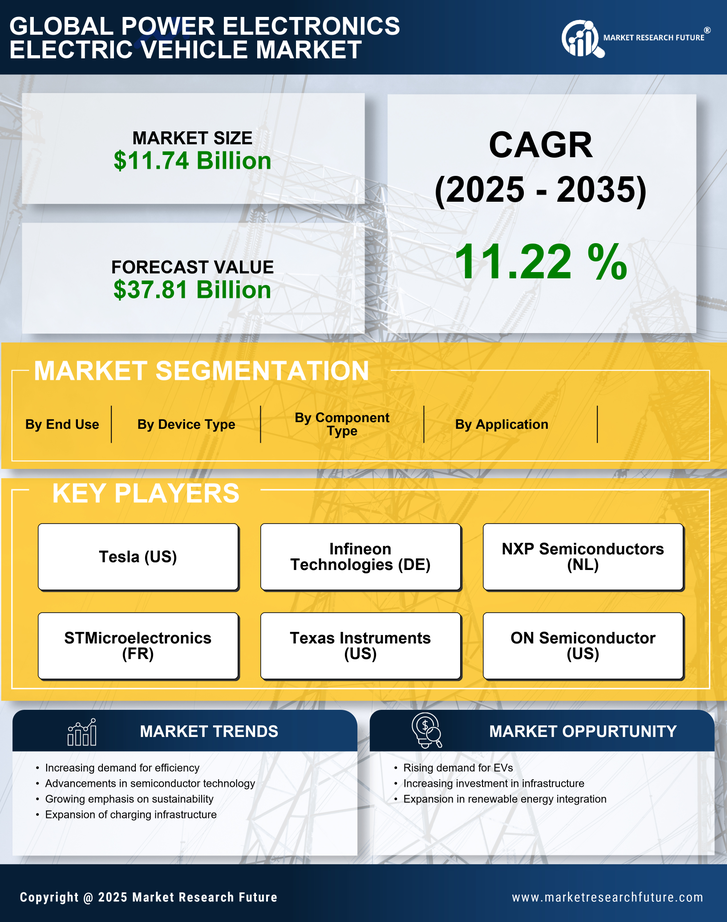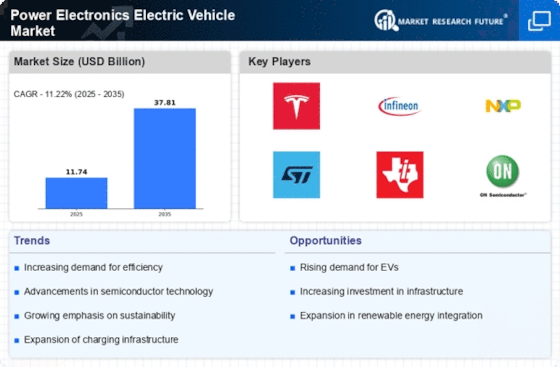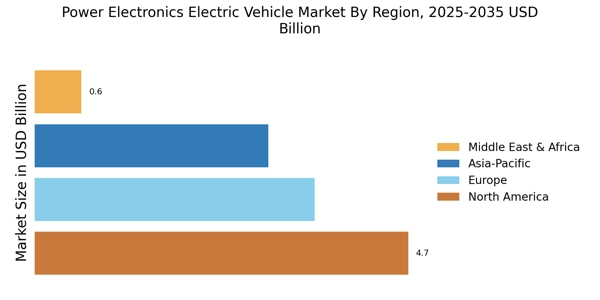Expansion of Charging Infrastructure
The expansion of charging infrastructure is a crucial factor driving the Power Electronics Electric Vehicle Market. As the number of electric vehicles on the road increases, the need for accessible and efficient charging solutions becomes paramount. Investments in charging networks, including fast-charging stations and home charging solutions, are being prioritized by both public and private sectors. This development not only alleviates range anxiety among consumers but also enhances the overall appeal of electric vehicles. Market analysis suggests that the charging infrastructure market is expected to grow substantially, with projections indicating a compound annual growth rate of over 30% in the coming years. This expansion is likely to create a more conducive environment for the Power Electronics Electric Vehicle Market, facilitating greater adoption of electric vehicles.
Collaborative Partnerships in the Industry
Collaborative partnerships among stakeholders in the Power Electronics Electric Vehicle Market are emerging as a significant driver of growth. Automakers, technology companies, and research institutions are increasingly joining forces to develop innovative solutions that enhance the performance and efficiency of electric vehicles. These collaborations often focus on advancing power electronics technologies, such as battery management systems and energy conversion devices. By pooling resources and expertise, these partnerships are likely to accelerate the pace of innovation within the Power Electronics Electric Vehicle Market. Furthermore, such alliances can lead to the establishment of standardized technologies, which may simplify the integration of power electronics in electric vehicles, ultimately benefiting consumers and manufacturers alike.
Technological Innovations in Power Electronics
The Power Electronics Electric Vehicle Market is experiencing rapid technological advancements that enhance the efficiency and performance of electric vehicles. Innovations such as silicon carbide (SiC) and gallium nitride (GaN) semiconductors are becoming increasingly prevalent, offering higher efficiency and thermal performance compared to traditional silicon-based devices. These advancements are projected to reduce energy losses in power conversion systems, thereby improving the overall range and performance of electric vehicles. Furthermore, the integration of advanced control algorithms and smart power management systems is likely to optimize energy usage, contributing to the growth of the Power Electronics Electric Vehicle Market. As manufacturers continue to invest in research and development, the market is expected to witness a surge in the adoption of these cutting-edge technologies, potentially leading to a more competitive landscape.
Rising Consumer Awareness of Environmental Issues
Consumer awareness regarding environmental sustainability is a pivotal driver for the Power Electronics Electric Vehicle Market. As individuals become more conscious of their carbon footprints, there is a growing preference for electric vehicles, which are perceived as a cleaner alternative to traditional vehicles. This shift in consumer behavior is prompting manufacturers to enhance their offerings in the Power Electronics Electric Vehicle Market, focusing on energy-efficient technologies and sustainable materials. Market data indicates that the demand for electric vehicles is expected to rise significantly, with projections suggesting that electric vehicle sales could reach over 30 million units annually by 2030. This increasing consumer demand is likely to stimulate further investments in power electronics technologies, thereby accelerating the growth of the market.
Increasing Regulatory Support for Electric Vehicles
The Power Electronics Electric Vehicle Market is significantly influenced by the increasing regulatory support aimed at promoting electric vehicle adoption. Governments across various regions are implementing stringent emissions regulations and providing incentives for electric vehicle purchases. For instance, several countries have set ambitious targets for phasing out internal combustion engine vehicles, which is likely to drive demand for electric vehicles equipped with advanced power electronics. Additionally, financial incentives such as tax credits and rebates are encouraging consumers to transition to electric vehicles, thereby bolstering the Power Electronics Electric Vehicle Market. This regulatory environment not only fosters innovation but also creates a favorable market landscape for manufacturers, as they align their product offerings with evolving governmental policies.















